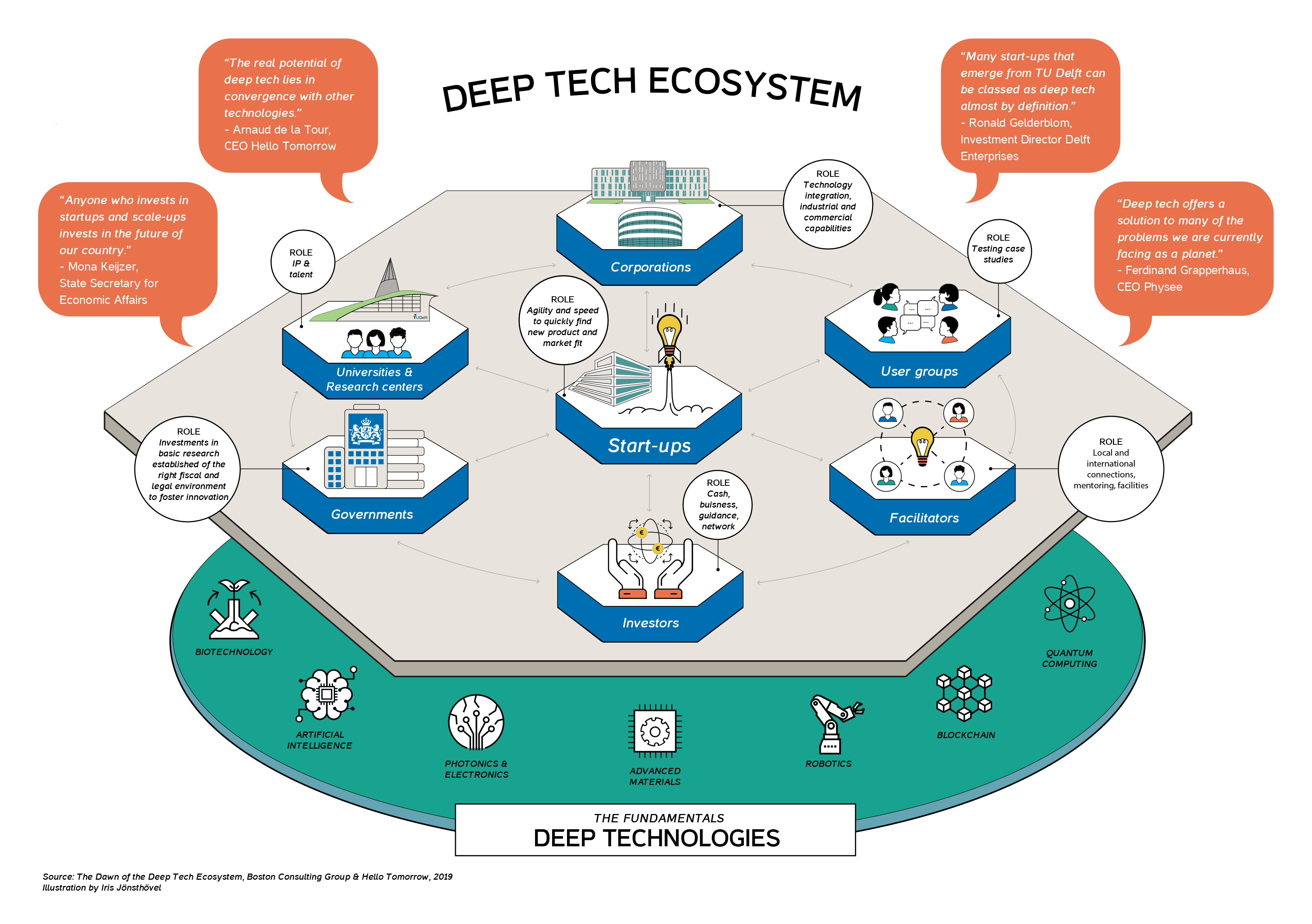
The promise of deep tech
New generation of technology companies offers solutions for major societal problems
By Jurjen Slump
The term ‘deep tech’ is increasingly being used in the context of radical innovation. It is a phrase steeped in mystery and expectation. Deep tech companies could solve major societal challenges, open up completely new markets and offer a key role for start-ups in the process. But what kind of technology is actually involved and is all the hype justified?
The term deep tech has come a long way since 2015. Swati Charturvedi from investors’ platform Propel(x) coined the term in a LinkedIn post in July of that year, in order to describe a ‘new category of technology start-ups’ in an effort to raise their profile among investors. “We knew there were several under-served areas in technology overlooked by investors searching for the next 'unicorn', she wrote.
"What investors may not realize is the potential for deep technology companies to dominate the future in many ways."
Eighteen billion
At around the same time, Arnaud de la Tour reached the same conclusion. Companies built around innovations based on breakthrough technologies – artificial intelligence, biotechnology, blockchain, drones and robotics, photonics, quantum and advanced materials – are sitting on goldmines. Since 2014, Hello Tomorrow has focused on accelerating these promising technologies from the lab to the market, in part by means of an annual competition (see box 'Hello Tomorrow Challenge' below article).
There's no shortage of funding. Between 2015 and 2018, worldwide investments in deep tech rose annually by more than 20% to exceed 18 billion, according to a report written by De la Tour together with the Boston Consulting Group (BCG). Among the 8,500 deep tech companies active worldwide studied in this report, 78 are in the Netherlands. They also all receive more funding than other tech companies.
Deep Technology is not only extremely powerful in itself, but could also have a huge impact on other areas of application. Think robotics, AI and quantum computers. The real potential lies in convergence with other technologies.
Arnaud de la Tour, CEO @ Hello Tomorrow
Disruptive
So why are investors so enthusiastic? It all comes down to the amazing promise offered by deep tech. “Many of these technologies address big societal and environmental challenges and will likely shape the way we solve some of the most pressing global problems”, write BCG and Hello Tomorrow.
They have the power ‘to create their own markets or disrupt existing industries’. The underlying intellectual property is ‘hard to reproduce or well protected’, which often gives them a ‘valuable competitive advantage’ according to the report.
Start-ups take the lead
“We call it deep tech in order to distinguish it from ‘normal’ tech like Uber”, explains De la Tour. Uber primarily involves an innovative business plan that enables users to deploy existing resources. Deep tech companies in the mobility sector would also include “autonomous vehicles, flying cars or other transformative technologies”, wrote Charturvedi.
De la Tour: “it’s technology that’s not only extremely powerful in itself, but could also have a huge impact on other areas of application. Think robotics, AI and quantum computers. The real potential lies in convergence with other technologies.”
Deep tech is also different in terms of the type of innovation. “It’s a new way of approaching R&D”, says De la Tour. “Fifty years ago, the big established companies together with universities were the engine that drove innovation. The second wave was made up of ICT start-ups in Silicon Valley. We’re now seeing the third wave, in which start-ups are taking the lead on all fronts, including deep tech.”

Flexible
There are several explanations for this. Deep tech start-ups are poised at the interface between fundamental research and the market, enabling them to respond rapidly to new developments. “Thanks to new platform technologies, such as 3D printing and software platforms, start-ups are also capable of developing technology, previously the sole preserve of major companies”, says De la Tour.
As far as Ronald Gelderblom, investment director at Delft Enterprises (DE), is concerned, deep tech is basically a new term for innovations in the field of breakthrough technologies. Delft Enterprises invests in spin-offs from TU Delft. “Many start-ups that emerge from TU Delft can be classed as deep tech almost by definition, because they’re always based on some kind of long-term research."
We genuinely need to look at deep tech from a different perspective. It’s a solution to many of the problems we are currently facing as a planet.
Ferdinand Grapperhaus, CEO at PHYSEE
Advantage
Investing in deep tech can be difficult for various reasons, but it has one significant advantage: the science behind the technology has already been validated. “The basics are always relatively robust. That’s a major plus point”, says Gelderblom. De la Tour agrees. “Normal start-ups begin with the problem. Deep tech starts with the technology – but they also need to quickly focus on a problem.”
What makes it difficult is the high level of complexity involved. A significant period of development has to be factored in. This complexity calls for thorough knowledge of technology, both within the start-up and among investors. Gelderblom: “Ideally, you have a couple of PhDs who’ve just completed their research and can join the company immediately.”
Big risk, big reward
A ‘significant portion’ of DE’s portfolio is made up of deep tech (see box below). Each of the themes mentioned above (artificial intelligence, biotechnology, blockchain, drones and robotics, photonics, quantum and advanced materials) has a research and innovation cluster in Delft.
“If a deep tech start-up proves successful, you can also make a great exit. A big risk can also be offset by a big reward”, says Gelderblom. The secret is to diversify the investment portfolio in such a way as to ensure that the successes compensate for any failures.
Deep tech in Delft
Delft Enterprises is investing in a range of different deep tech start-ups and scale-ups. Alongside PHYSEE, they include Villari, VSParticle and Umincorp.
- Villari provides a revolutionary approach for the permanent monitoring of fatigue crack propagation in steel structures using cutting-edge wireless sensor technology.
- VSParticle is a nanotechnology company that provides research and industry with the tools to manufacture nanoparticles and nanostructured materials, thereby drastically reducing the development time of new materials and products.
- Umincorp has developed a technology that separates plastics with such accuracy that it enables true circularity of plastics. It doubles the recovery rate at lower cost, less environmental burden, and higher selectivity than state-of-the-art alternatives.
Deep tech calls for ‘patient capital’
The long period of development means that investors need to be patient. On average, this takes ten to twelve years, compared to the two to three years that is standard for the Ubers of this world. This kind of ‘patient capital’ is in very short supply in the Netherlands, says Ferdinand Grapperhaus, CEO at PHYSEE. This deep tech company, founded by Grapperhaus with CTO Willem Kesteloo, is developing a SmartSkin for buildings: an intelligent façade that can generate energy, significantly reduce consumption and regulate the indoor climate.
This involves a whole host of breakthrough technologies: from algorithms that collect the data from buildings to use as the basis for climate control to the development of a so-called luminescent solar concentrator, an invisible coating that captures sunlight falling on the façade and converts it into electricity. The basic principle: the customer should not be able to see the difference between a normal window and an innovative window. Kesteloo calls this ‘sustainability without compromise’.

Impact-driven investment
Grapperhaus firmly believes that both the Dutch government and the EU should focus much more on deep tech and on the investments required. “Europe excels at deep tech, although we didn’t call it that in the last hundred years. But Philips, ASML, TomTom: of course, it's all deep tech.”
This is why Grapperhaus is an advocate of ‘impact-driven investment’. The National Growth Fund (Groeifonds), as well as Invest-NL, for example, or major investors such as pension funds, should set a strict condition that 20% of any investments must be in technologies that contribute to a better world. “We genuinely need to look at deep tech from a different perspective,”, says Grapperhaus. “It’s a solution to many of the problems we are currently facing as a planet.”
Deep Tech Fund
The Dutch government seems to take the same view. A week after our interview with Grapperhaus and Kesteloo, the Cabinet and Invest-NL announced joint plans to invest half a billion euros in growth companies, partly by means of a Deep Tech Fund targeting knowledge-intensive start-ups and scale-ups.
It is ‘our duty to create prospects for growth companies and support them in their development’, said State Secretary Keijzer (Economic Affairs and Climate Policy), when making the announcement. “Their growth delivers jobs and income for all of us, brings new products and technologies onto the market and keeps our economy strong.”
Ecosystem
In other words, deep tech is ‘the enabler of the future’. It is increasingly driven by start-ups, closely associated with the university, investors, industry, incubators and field labs. A deep tech ecosystem of this kind is essential. It brings together all the parties needed for the development of complex innovations. It is also one of the reasons why PHYSEE is based at TU Delft Campus.
“Climate change, the pandemic, the way we consume. We need technological breakthroughs to initiate a transition around big societal issues”, is how De la Tour summarizes it. “The good news is that the solutions are there. We just need to get them to the market.
Lilium
It has now become clear that Charturvedi's words were prophetic. In 2016, the Hello Tomorrow Challenge was won by Lilium, a German start-up – then just a year old - that developed an autonomous, electric flying taxi capable of vertical take-off and landing. This year saw the company grow to become a unicorn. And it really does look a lot like a flying car.
Deep tech & radical innovation
How does deep tech relate to different forms of innovation? Experts draw a distinction between four types of innovation: incremental, sustaining, disruptive and radical.
- Incremental innovation involves the gradual improvement of existing products and services. Examples might include a new Gillette razor or a new TV.
- Like incremental innovation, sustaining innovation also involves gradual improvements to existing products as a way of maintaining market position. The new iPhone is an example of that.
- Disruptive innovation relates to new business models that disrupt existing markets, such as Netflix.
- Radical innovation involves innovations based on technological breakthroughs that transform whole arms of industry and often create new markets. The PC and the internet are examples of that.
Radical innovation also includes innovations that can solve major societal problems. Although deep tech can also be disruptive, it primarily involves radical innovation.
Hello Tomorrow Challenge
The Hello Tomorrow Challenge is an annual competition for deep tech entrepreneurs. Entrants are brought into contact with investors, incubators and gain a lot of exposure as a result. The winner gets €100,000. For more information, visit hello-tomorrow.org.
